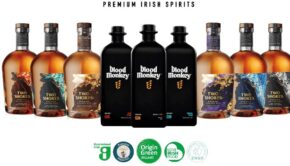NOffLA speaks: Costly decisions

The Government has had to make many tough decisions and equally, its decisions have made it very tough for the independent off-trade
16 November 2009
“We are facing an extremely difficult set of economic circumstances and it is clear that we are in for a difficult number of years.” The words of Minister for Finance, Brian Lenihan, shortly before last April’s supplementary budget. The minister’s words proved to be an understatement of the difficulties in which we find ourselves. The subsequent mini budget did nothing to improve the business circumstances of the Irish off-trade. The sector has since continued its decline as the independent off-trade is affected by several aspects of the recession and by the fallout of other government decisions.
NOffLA chairman, Jim McCabe, has previously written to the minister making the case for the Irish independent off-licence sector. McCabe acknowledged the difficulties experienced across a range of Irish businesses, but explained that “our own sector is being especially hard hit as a result of high excise duties, the sterling-euro currency differential and the irresponsible trading of alcohol by the large multiples who merely view alcohol as a means of gaining footfall in their stores.” These issues continued to decimate the Irish off-trade throughout 2009.
Competing with the North
A number of recently published reports and surveys put the fall in the Irish off-trade business at between 10% and 15%, with a much greater impact in particular parts of the country. This fall in turnover has taken place alongside the slashing of margins as independent outlets attempt, not only to compete with their local supermarket, but often with Northern Ireland retailers who operate with a far more favourable taxation system and lower overheads. Clearly such tactics are not sustainable and can only be regarded as emergency measures to allow Irish off-licences to survive until the market improves and Government acts to create a level playing field.
Government appears blind to the realities of cross-border shopping and its consequences. As more southern families used the opportunity of the Halloween mid-term break for shopping trips north, Tánaiste and Enterprise Minister Mary Coughlan claimed that this was a result of the difference between sterling and euro, completely ignoring the huge differences in taxes between both regions. The Tánaiste was definitive in expressing her wish: “What I don’t want to see this Christmas is people moving north in order to carry out their purchases,” but went on to claim that “We have seen a considerable reduction in the price of goods and services so that people can see better value for money.”
The reality is very different to the Tánaiste’s platitudes. Recent figures released by Inter-Trade Ireland show that the numbers of southern-registered cars in shopping centres in Newry, Enniskillen and Derry has increased from 40 to 50% in the summer to 70% in October. TNS Worldpanel has calculated that almost 16% of Irish households, or 250,000 in total, now travel north to shop, demonstrating a 25% increase in these numbers since last December equal to 50,000 extra shoppers.
This is the reality, Tánaiste, and no amount of soothing words about a “considerable reduction in the price of goods and services” will change the inequity of taxation on alcohol between the two parts of this island. The forthcoming budget offers an opportunity to take some action to address this inequity before it is too late for those retailers who remain in business.
NI off-sales up 30%
New figures from Nielsen Ireland reveal that off-licence sales in Northern Ireland have increased by 30% in the first nine months of this year, while the same figures show a fall of 7% in the Republic of Ireland.
These figures would suggest that 10% of southern off-licence trade has already been lost to Northern Ireland’s off-licences, according to Rosemary Garth, director of the Alcohol Beverage Federation of Ireland (ABFI). Garth said that Government must begin to address the high alcohol taxes that exist in Ireland, which make a significant contribution to the price differential north and south.
Pointing to the loss to Government as well as retailers, she explained that: “Both drinks industry and retail groups have estimated that cross-border shopping has cost the Irish Exchequer €400 million in lost revenue this year. This figure is set to increase in advance of Christmas as thousands more shoppers will understandably choose to shop in Northern Ireland, in particular should the rate of sterling continue its present decline against the euro.”
“The consequences for jobs and revenue, particularly in the border region, are profound,” added Garth.
Our industry supports 90,000 jobs across bars, restaurants, manufacturing and supply. Many of these will be at risk as a direct consequence of cross-border shopping.“The Government must begin to address this. They are losing hundreds of millions of euro in VAT and excise revenues, with the British Exchequer directly benefitting. Irish consumers face the highest alcohol taxes in Europe and the Government must now urgently review our excise regime with a view to lowering these rates to stem the tide of trade to Northern Ireland and help this vital industry.”



 Print
Print






Fans 0
Followers